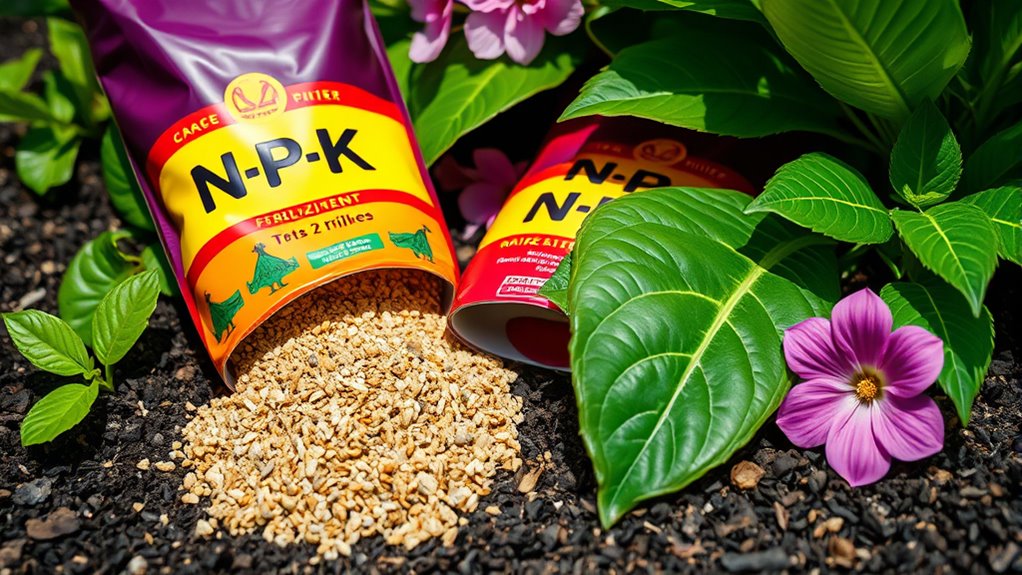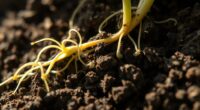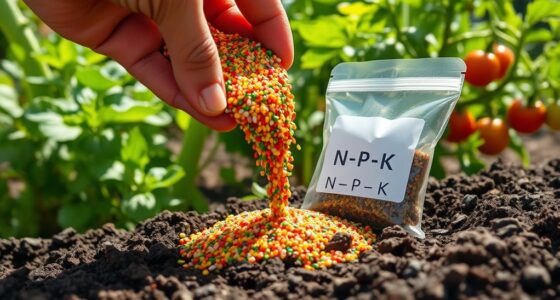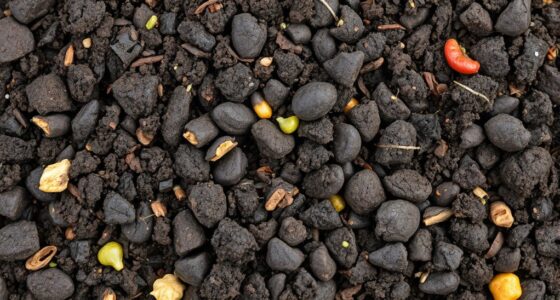Understanding N-P-K ratios helps you choose the right fertilizer for your plants’ needs. N stands for nitrogen, which promotes lush foliage; P is phosphorus, supporting root growth and flowering; K represents potassium, which enhances overall plant health and fruit development. By matching these ratios to your plants’ specific requirements, you can improve growth and yield. To get the most out of your fertilizers, it’s important to learn how each nutrient affects your garden—more useful tips await.
Key Takeaways
- N-P-K stands for Nitrogen, Phosphorus, and Potassium, the primary nutrients in fertilizers essential for plant growth.
- Nitrogen promotes leafy growth, phosphorus supports root and flower development, potassium enhances overall plant health.
- Understanding your plants’ needs helps select the right fertilizer with appropriate N-P-K ratios for optimal results.
- Soil testing guides you to adjust fertilizer types and amounts, preventing deficiencies or nutrient imbalances.
- Combining organic and synthetic fertilizers can provide balanced nutrition, supporting healthy, sustainable plant development.

Have you ever wondered how plants thrive and produce abundant crops? The secret often lies beneath their roots—specifically, the soil you provide them. Soil pH plays an essential role in plant health because it determines how well plants can absorb nutrients. If the soil is too acidic or too alkaline, certain nutrients become less available, leading to stunted growth or poor yields. For example, most vegetables prefer a soil pH between 6.0 and 7.0, where nutrients are most accessible. Adjusting soil pH may involve adding lime to raise alkalinity or sulfur to lower acidity, guaranteeing your plants get the nutrients they need. Proper soil testing and nutrient management are crucial steps in maintaining optimal soil conditions.
Soil pH crucially impacts plant health by affecting nutrient absorption and growth.
When it comes to fertilizing, you’ll encounter two main types: organic and synthetic. Organic fertilizers come from natural sources like compost, manure, bone meal, or fish emulsion. They tend to release nutrients slowly, improving soil structure over time and fostering beneficial microbial activity. Synthetic fertilizers, on the other hand, are chemically manufactured and deliver nutrients rapidly. They provide precise nutrient ratios and are often used for quick results, especially in commercial farming or when plants show signs of deficiency. Both types have their advantages: organic fertilizers enhance long-term soil health, while synthetic options can give immediate nutrient boosts. Depending on your gardening goals, you might choose one over the other or even combine them for balanced nutrition.
Understanding soil pH and the differences between organic and synthetic fertilizers helps you make better decisions about what to apply to your garden. For instance, if your soil is too acidic, you might add lime and choose organic fertilizers rich in calcium to balance the pH and supply essential nutrients. Conversely, if you need quick results, a synthetic fertilizer with a balanced N-P-K ratio can give your plants an immediate nutrient boost. Keep in mind that over-fertilizing, whether organic or synthetic, can harm plants and the environment. Always follow application instructions, and consider testing your soil periodically to track pH and nutrient levels. This way, you’re not just throwing fertilizers onto your plants blindly but applying what they truly need for ideal growth.
In short, understanding the relationship between soil pH and the type of fertilizer you use can considerably improve your gardening success. By tailoring your approach—adjusting soil pH when necessary and choosing the right fertilizer type—you set up your plants for healthier growth and higher yields. Whether you opt for natural or chemical solutions, knowing what your soil and plants require ensures you’re giving them the best foundation for thriving, productive growth.
Frequently Asked Questions
How Often Should I Fertilize My Plants?
You should fertilize your plants based on their specific needs and the soil pH, which affects nutrient uptake. Typically, fertilize every 2-4 weeks during the growing season, but adjust fertilizer timing if your soil is too acidic or alkaline. Keep an eye on plant health and growth; if they look healthy, you might extend the interval. Always follow package instructions for best results.
Can I Over-Fertilize and Harm My Plants?
Think of your plants like a delicate dance; too much fertilizer can throw off their rhythm. Over-fertilizing can cause fertilizer toxicity, damaging roots and affecting soil pH balance. You might notice yellowing leaves or stunted growth, signaling harm. To avoid this, follow recommended application rates and monitor your soil’s pH, ensuring you nourish without overwhelming your plants’ natural needs.
Are Organic Fertilizers Better Than Synthetic Ones?
You might wonder if organic fertilizers are better than synthetic ones. Organic options typically improve soil health and foster beneficial microbes, which enhance nutrient absorption over time. They release nutrients slowly, reducing the risk of over-fertilizing. Synthetic fertilizers provide immediate nutrients but can harm soil structure if overused. Ultimately, choosing organic fertilizers supports long-term plant health and sustainable soil conditions, making them a great choice for nurturing your garden naturally.
How Do I Choose the Right Fertilizer for My Garden?
To choose the right fertilizer, start with soil testing to determine your garden’s specific nutrient needs. Consider your plants’ growth stage and use fertilizer timing to apply nutrients when they’re most needed. Opt for organic or synthetic options based on your preferences, but always follow application instructions carefully. This approach guarantees your garden gets the right nutrients at the right time, promoting healthy, thriving plants.
Do Different Plants Require Different N-P-K Ratios?
Think of your garden as a symphony, where each plant plays its own tune. Yes, different plants require specific N-P-K ratios, like unique instruments needing tailored notes. You should focus on plant-specific nutrients to achieve fertilizer customization, ensuring each plant gets the right balance for ideal growth. By matching fertilizer ratios to your plants’ needs, you help them thrive, turning your garden into a harmonious masterpiece.
Conclusion
By understanding N-P-K and your plants’ needs, you can choose fertilizers that truly boost growth. For example, imagine a gardener who notices their tomatoes aren’t ripening. By adjusting the fertilizer to balance nitrogen and potassium, they see faster, healthier fruit production. Remember, paying attention to what your plants need and applying the right nutrients makes all the difference. With the right knowledge, you’ll nurture a thriving, vibrant garden all season long.









